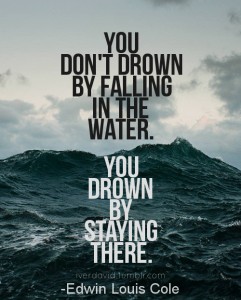I don’t like having to accept or digest that truth that I am, at times, my own worst enemy. It’s uncomfortable for me to hear that truth. It’s even more difficult when I know it myself and don’t take steps to change. Were it not Elul (the month prior the Jewish High Holiday and my tradition sees the month as a time of introspection) I probably would have dismissed this truth. Had I not been actively working on specific middos (character traits) for the past 32 days and also been actively keeping a cheshbon hanefesh (a spiritual accounting) I would have blown off the notion that I am my own worst enemy when I hold myself back. I’m drowning and it’s my fault. I’ve been saying this for the past day, but seeing it typed sort of makes it official. The reality is that it is Elul and if there was ever a time for me to be receptive, then this is the time, baby.
It not easy. The person who carried this message to me is someone that wants what is best for me. Being presented with the opportunity to absorb this truth is sort of a “make it or break it” thing. It’s not a “flight or fight” thing because fleeing from knowing that I’m my own worst enemy means simply lying to myself. Accepting this means only one thing…action. No excuses, rationalizations, or verbal attempts to circumvent reality. Accepting that I am the only one that can take action to change myself (with Hashem’s help) mean also accepting that all isn’t great in Neilville. Using the term connotative dissonance or simply attributing this lack of action to not seeing enough Nike ads (“Just Do It.” doesn’t stop pain of realizing what I need to really change. It’s got nothing to do specific mitzvos (commandments) or middos or my yetzer hora (evil inclination). It’s about connecting both with who I really am and with my creator. I know this not because it was told to me or it was something that I read. I know, but of tears. When we cry it’s either because of joy and not having the proper words to express that joy or it’s because of sadness. A sadness that a person has when their heart is broken. Not broken my someone they love, but broken because they realize they need help and they realize that the path they took wasn’t the right one. The decisions they made only pushed them farther from their potential. Maybe this resonates with someone, I don’t know. What I know is that it’s from the heart.
“There is nothing as whole, or as perfect, as a broken heart.” – Menachem Mendel of Kotzk, the Kotzker Rebbe
If a heart is broken then how can it be whole? Because once we have a broken heart then we can see what is needed to mend it. Like the tagline at the end of the old G.I. Joe cartoons, “…and knowing is half the battle.” When I know my deficiencies, my weak points, and the root of them (in this case, holding myself back from what needs to be done), then I’m able to see the actions that can repair things. This makes a broken heart whole. This gets you to swim so that you don’t drown.



Despite the emotion of the moment, make sure to try to be as objective as you can. You don’t want to slip into an unproductive sadness. Recognize your good points, too. These give you the potential to improve.
The idea that “I am my own worst enemy” is totally not true according to the Torah. And if you are telling yourself that then definitely sadness is going to follow. The yetzer hara is a person’s worst enemy and it has many, many, many disguises. You are not your yetzer hara but if you think a thought like “I am my own worst enemy” and believe it then you can be sure you are taking your yetzer hara’s advice. My suggestion is to stop telling yourself that and to pursue getting clear on who you are and who you are not. Rav Ithamar Schwartz is good place to start and so is a workshop that teaches the practical applications of his works called Yashar. Email info@bilvavi.net and ask for info about Yashar.